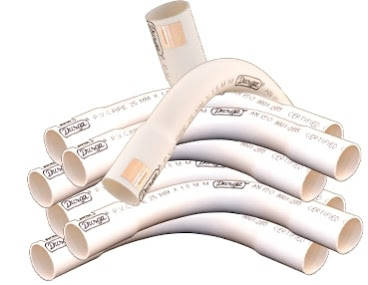Exploring the Versatility of Electrical PVC Conduit Pipes
In the realm of electrical wiring, safety is paramount. The proper installation of wiring not only prevents minor inconveniences like power outages but also averts significant hazards such as fires. Enter electrical conduit pipes, a vital component in ensuring the safety and efficiency of electrical systems. In this blog, we delve into the different types of electrical PVC conduit pipes, shedding light on their uses and advantages.
Electrical PVC Conduit Pipes: A Safety Essential
Safety concerns in electrical wiring can be mitigated by the use of electrical conduit pipes. These pipes act as protective channels, preventing issues like broken wires and power outages. Moreover, they are instrumental in minimizing the risk of fire and ensuring a secure environment in various settings, including residential homes, businesses, and industrial plants.
Understanding the Variety: Nonmetallic Tubing
A notable distinction in electrical conduit pipes lies between metallic and nonmetallic tubing. The latter, known as Electrical Nonmetallic Tubing, is crafted from plastic corrugated material, imparting flexibility. This type of conduit provides moisture resistance, making it an ideal choice for indoor electrical installations. It is commonly used within concrete, wood, or metal framing surfaces, offering an additional layer of safety.
Plastic Electrical Conduit: Flexibility and Functionality
Plastic electrical conduit emerges as a flexible and easily bendable solution, often employed in tandem with rigid metal conductor cables. This type of conduit is perfect for short-distance wiring, facilitating a seamless connection between electronic equipment and serving applications like wiring around walls or appliances such as washing machines.
Rigid PVC Conduit: Durability Meets Versatility
Rigid PVC conduit stands out as a robust choice, finding its primary application in industrial, commercial, and utility environments. The durable PVC material allows for installation in exposed and underground locations, withstanding impacts and displaying corrosion resistance. Additionally, this conduit offers enhanced fire resistance and shields against various magnetic interferences that could disrupt the overall wiring system.
Choosing the Right Conduit: Factors to Consider
When deciding on a suitable electrical conduit pipe, several factors come into play. The material used in manufacturing, environmental exposure, and intended usage locations are crucial considerations. Understanding the unique properties of each conduit type ensures that the selected solution aligns with the specific needs of the wiring project.
Trust Quality, Trust Durga Electroplast
In the pursuit of high-quality and reliable electrical conduit pipes, look no further than Shree Durga. As a leading electrical plastic manufacturer of flexible pipes in Jharkhand, UP, and Bihar, Durga stands as a trusted provider of strong pipes capable of withstanding diverse situations. The extensive range of pipe sizes and color options, including grey, black, red, blue, yellow, and white, offers versatility that caters to varied preferences and requirements.
Conclusion: Elevating Electrical Safety with Durga
In conclusion, the importance of electrical conduit piping cannot be overstated. From organizing wiring to ensuring safety, electrical conduit pipes play a pivotal role in diverse settings. Choose quality, choose reliability, choose Durga, and bring home goodness with secure and efficient electrical systems.
Trust the experts at Durga– your partner in securing a safer and more efficient electrical future.




Comments
Post a Comment